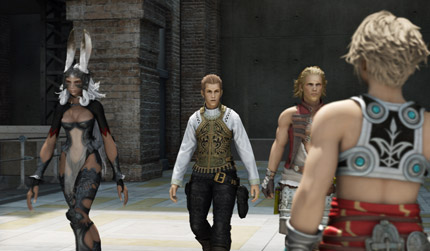The game begins by focusing on a young thief in a subjugated country, and expands to include a varied cast that includes a dapper air pirate, a deposed princess, and a fallen hero among other interesting characters. Cities are sprawling and densely populated, environments are expansive and just as densely populated with things that want to kill you. The world actually seems to be going through the motions of existing. People and things both walk around and do their own thing, and you can approach enemies physically in the same way as you'd approach a townsperson. After a brief introductory system gives you a taste of the gameplay and hooks you into what will become an grand journey.

Although you're caught up in an epic adventure, there are hundreds of monsters and adversaries between you and a satisfying conclusion. Defeating of scores of foes is part of the pleasure in RPGs, and the "gambit system" is XII's big innovation in monster-slaying. By using gambits, players create battle strategies for each character, removing the need to select each individual action from a menu. The result is that you don't need to bring up a menu for every time you want to attack an enemy or cast a spell; although you can play that way if you like (you don't have to use gambits at all if you don't want to). The gambits aren't there to take away your glory, they only mean to take away some of the busy work.
At first the gambits you can create are very simple, for example directing characters to automatically attack enemies or heal injured an injured comrade. Basic attack-and-heal strategies are enough to effectively smite the vast majority of enemies you'll come across, which really says something about the nature of fighting in many RPGs -- namely that foes aren't necessarily there to provide a challenge, but to look cool and menacing (which they do; the bestiary is creative and full of variety) and feed you a steady stream of gratifying victories and delicious experience and license points you can use to make your character even stronger. The gambit system ends up doing a great job serving up constant, compelling battles and proves to be flexible, interesting, and rewarding.





 Outstanding!
Outstanding!


